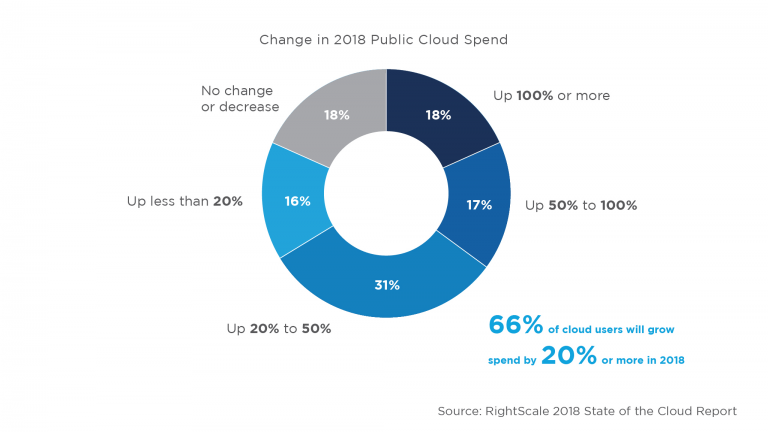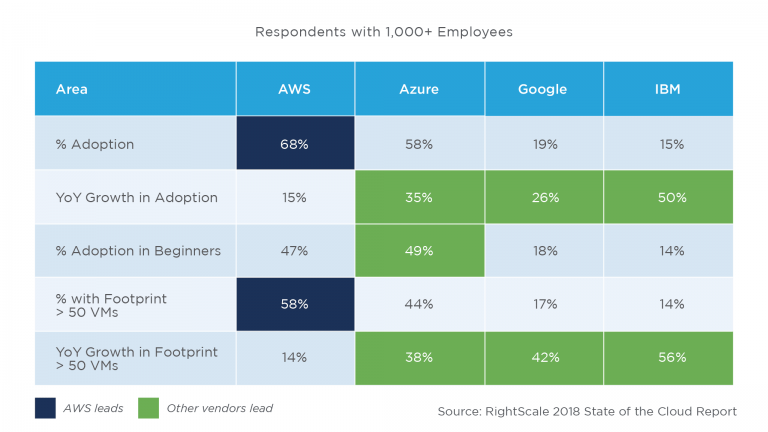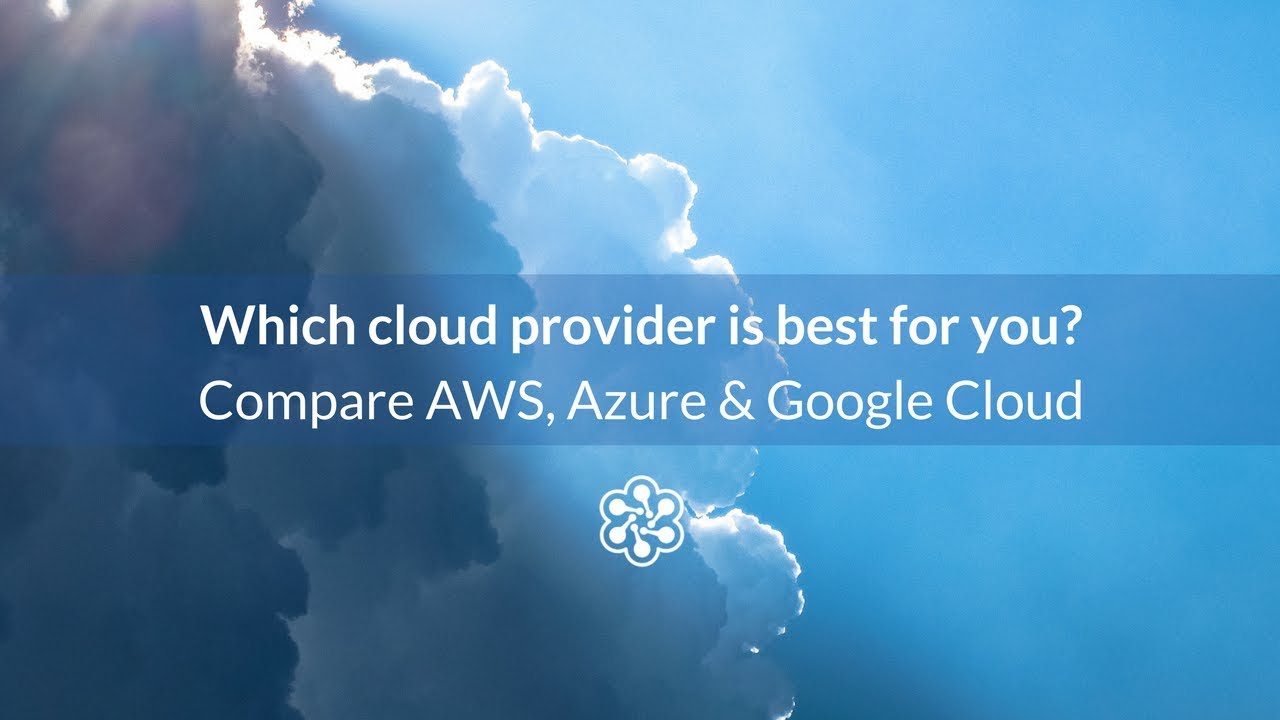Google. Amazon. Microsoft – who will win the Cloud war?
We live in the most competitive times possible, especially in the technology and online markets, with knowledge and advances added daily. Cloud computing is the delivery of on-demand computing services — from applications to storage and processing power — typically over the internet and on a pay-as-you-go basis.
Instead of owning their own computing infrastructure or data centers, companies can rent access to anything from applications to storage from a cloud service provider. One benefit of using cloud computing services is that firms can avoid the upfront cost and complexity of owning and maintaining their own IT infrastructure, and instead simply pay for what they use, when they use it. And that, while providers of cloud computing services can benefit from significant economies of scale by delivering the same services to a wide range of customers.

source: RightScale
In January 2018, RightScale conducted its annual State of the Cloud Survey. The survey questioned technical professionals across a broad cross-section of organizations about their adoption of cloud infrastructure. The 997 respondents range from technical executives to managers and practitioners and represent organizations of varying sizes among many industries. Respondents represent companies across the cloud spectrum, including both users (19 percent) and non-users (81 percent) of RightScale solutions. Their answers provide a comprehensive perspective on the state of the cloud.

The full report can be downloaded here.
Top 5 marketing campaign that failed in 2016
Sometimes, no matter how big the budget is, some marketing campaigns go completely wrong. There are a large number of reasons for those situations, some of them being the lack of proper research, of attention or just simple the agency’s use of juniors. Here are some of the last year’s biggest marketing mistakes:
Microsoft and the Millennials

Microsoft’s latest attempt to recruit the next generation of engineering talent has backfired, as its rather awkward attempts at ‘Millennial speak’ have been roundly mocked on social media. In a bizarre effort to look hip, Microsoft promised “dranks,” “noms” and other buzzwords at a party for “bae interns.”
Jägermeister and the pool party that turns into chemical warfare
In Leon, Mexico, Jägermeister hosted a part in which its staff poured liquid nitrogen into the pool to ‘create a cool effect,’ an act which created a poisonous cloud, hospitalizing eight and putting one man into a coma. And that while the campaign’s tagline was: party responsibly.
Scott Disick’s Instagram fail

“Keeping Up With The Kardashians” star Scott Disick has become the subject of web ridicule after mistakenly including all the instructions his advertisers sent him on a paid Instagram post.
Microsoft AI Chatbot gone wrong
In March 2016, Microsoft created an artificial intelligence chat bot that talked like a Millennial and learned from humans. But its good intentions backfired, with rogue web users getting it to cite Hitler and support Donald Trump. The conversation extended to racist, inflammatory and political statements.
McDonald’s and the fitness tracker
McDonald’s fitness tracker happy meal toy was claimed to bring out its users in a rash. A McDonald’s US representative said the firm had decided to remove them “after receiving limited reports of potential skin irritations that may be associated from wearing the band”. Reports of skin irritation have derailed plans by McDonald’s to give out fitness trackers instead of toys in its Happy Meals. According to The Guardian, McDonald’s was hoping the Step It! Activity Band would be a means of getting kids to be more active, Digital Trends reported. The colorful plastic device strapped on like a watch and tracked steps. It blinked as the wearer walked and blinked more rapidly the faster they moved.
Warner Brothers reports its own website as illegal
Film studio Warner Brothers has asked Google to remove its own website from search results, saying it violates copyright laws. The requests surrounded movies like The Dark Knight, The Matrix and The Lucky One. In each of these instances, Warner Bros requested that its own official pages be removed from search results. It also asked the search giant to remove links to legitimate movie streaming websites run by Amazon and Sky, as well as the film database IMDB. The request was submitted on behalf of Warner Brothers by Vobile, a company that files hundreds of thousands of takedown requests every month.
Some more examples during the years, here.
Don’t be afraid of the cloud, most of your data is already out there
Afraid of storing your data on the cloud? Don’t. Just think at the fact that any email service you are using (Gmail, Yahoo, Hotmail etc.) is already using the cloud, so your data is backed-up up there. None of those emails you send and receive are actually taking up space on your local hard drive, but they are stored on the email providers’ servers: this is a form of cloud computing.
Actually, cloud storage means minimal downtime and it significantly reduces the possibility of losing data, because rather than storing it in one physical location, information is placed in several servers, in multiple locations. So if one server goes down, the data doesn’t disappear. Cloud storage is convenient, and with the right precautions, it’s about as secure as keeping the data on-site at all times.
According to cloud-lounge.org, many businesses large and small use cloud computing today either directly (e.g. Google or Amazon) or indirectly (e.g. Twitter) instead of traditional on-site alternatives. And there are a number of reasons why cloud computing is so widely used among businesses today: Reduction of costs (unlike on-site hosting the price of deploying applications in the cloud can be less due to lower hardware costs from more effective use of physical resources), universal access (remotely located employees can access applications and work via the internet), choice of applications (flexibility for cloud users to experiment and choose the best option for their needs), potential to be greener and more economical (the average amount of energy needed for a computational action carried out in the cloud is far less than the average amount for an on-site deployment), flexibility (allows users to switch applications easily and rapidly, using the one that suits their needs best).

Moreover, according to wired.com, the cloud offers better insight, helps collaboration between the members of the teams, drives better engagement (as cloud is often seen as the most effective means of forging a tighter link with the customer), its benefits are measurable and pay for themselves.
But, if after all of these you are still afraid of using it, remember that many cloud services offer additional security options on top of the basic packet and you have at your disposal several measures you can take in order to protect your data. Tim Maliyil, CEO and data-security architect for Las Vegas-based AlertBoot, explained some of them for entrepreneur.com:
- Encrypt everything. Any cloud service a startup uses should implement encryption on the server side. Even if the cloud infrastructure were to be compromised, a hacker would only be able to access encrypted gibberish and no data would be stolen.
- Have a strong password. While the death of the password as a security linchpin is long overdue, it’s still the easiest point of access for users and hackers. Be sure your passwords are at least 15 characters long and include numbers, letters and special characters if possible.
- Start early. The reason major chains such as Home Depot and Target tend to be susceptible to security breaches isn’t simply because they’re high-profile organizations. Larger, more complex companies have a harder time implementing comprehensive security solutions than do smaller, more nimble companies.
Put security protocols in place while the infrastructure is still manageable so security can scale with the company instead of playing catch-up. Additionally, if the company targets regulated industries such as health care, proof of meeting data-security-compliance requirements will be needed for conducting business.
Data breaches don’t so much reflect an inherent insecurity in cloud services as they do a problem with how the available measures are implemented. Cloud services have allowed startups to thrive and scale at a fraction of the cost of companies running their own server farms. Use cloud services to build end-to-end security so as to get back to focusing on the important things: the company’s products and customers.
Part of those piece of advice can be found also on Drew Hendricks of Inc.com’s list, from which we would also mention the following:
- Backing up sensitive files. While file sharing and syncing are effective ways to back up documents, they should not replace the use of external devices. By backing up files virtually and physically, you can all but guarantee your firm will have access to its data even in the event of system crashes or attacks.
- Separating personal from corporate data. Whether your business features a “Bring Your Own Device” (BYOD) culture or not, you need to communicate clearly with employees about what information can and cannot be stored on personal devices, as well as what encryption methods are required.
- Keep sensitive materials out of the cloud. Until cloud providers can offer comparable levels of security to what is available on an internal business server, they may not be worth the risk for some data.


